|
In Term 1 we ran our first Lego Social Skills Group. We had 10 participants from ages 5-13 across two sessions. The children quickly warmed up and became engaged and enthusiastic to belong to the group. The group members had a diverse set of interests, skills and personalities, and we enjoyed getting to know them all. Parents generally enrolled their children because they felt a need for the children to learn more effective social skills and that meant different things for different families. For some children this meant learning assertiveness or knowing how to make and keep friends. For others, the parents were concerned about limited cooperation, sharing and turn-taking skills. While many of the children had a diagnosis of Autism Spectrum Disorder and/or Attention Deficit Hyperactivity Disorder (ADHD), this was not a criteria for group entry. The one thing all children had in common was their love of Lego and eagerness to work on the group projects. We started each session with a mini-lesson. These lessons included topics such as: tone of voice, assertiveness, communicating with our eyes, and how to fill someone's 'bucket' with our kind words and actions. In groups of three, children then began their group Lego projects. One child was the engineer (in charge of reading the instructions), one child was the supplier (had to find the pieces) and one child was the builder (put the pieces together). These roles changed each week. The children had to communicate clearly, wait their turn, practice frustration tolerance, and do their job in order for the project to be successful. They also got to celebrate together and felt a joint sense of pride when they achieved their goal. The role of the psychologists was to facilitate the interactions and assist the children with problem solving, task behaviour, joint attention, effective communication and adaptive coping strategies when things weren't going their way, and provided positive reinforcement for appropriate social interactions. The content of our group sessions was guided by research that has shown Lego-based interactive therapy in this format improves social competence over the long-term. In the final weeks of term, we taught the children how to make stop motion animations using the Lego Movie Maker app. Children worked in pairs to decide on characters, build a set, create a plot and take the photos to make their movie. Again, the psychologists coached the children to use their social communication skills during this project. All in all, Lego group was a hit, and the children enjoyed the sessions (and I suspect for the most part they did not even realise they were 'learning' as the coaching merged seamlessly into the activities).
Bring on Term 2! To register click here Comments are closed.
|
Categories
All
|
Hopscotch & HarmonyAt Hopscotch & Harmony Psychology, you can expect compassionate care and evidence-based guidance on your journey to wellness.
With clinics in Werribee and Belmont, as well as providing online counselling to clients who live throughout Australia, our dedicated team of psychologists and dietitians are committed to providing support to children, teenagers and adults. With a focus on understanding your unique needs, we offer tailored solutions to foster growth and resilience. Trust in our experience and dedication as we work together towards your well-being. Welcome to a place where healing begins and possibilities abound. |
Our services |
Contact usHopscotch & Harmony
Child, Teen and Adult Psychology Our Locations:
WERRIBEE: 1/167-179 Shaws Rd
BELMONT: 92 Roslyn Rd AUSTRALIA-WIDE: Online counselling |
Hopscotch and Harmony respectfully recognise the Aboriginal and Torres Strait Islander people as the first Peoples of the continent now called Australia.
We acknowledge the Bunurong and Wadawurrung people of the Kulin Nation, the traditional owners of the land on which we work, and pay our respects to their Elders, past, present and emerging.
© 2024 Hopscotch and Harmony Pty Ltd


 RSS Feed
RSS Feed
